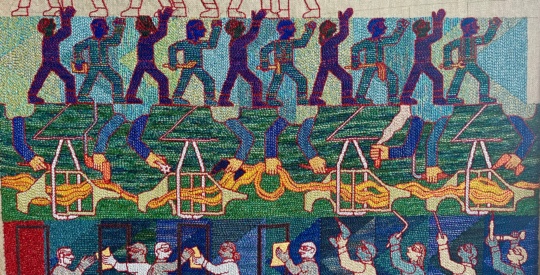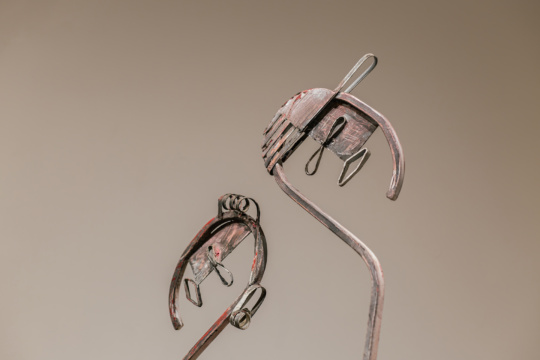[cont.]
They debated surgery. She insisted that he consider it. He told her it would be counterproductive. He would start radiation treatment the next morning and following that would be chemotherapy. When he went upstairs to attend to “some business” before checking into the hospital, she decided to spend those minutes madly searching on the internet. Pancreatic cancer, she found out, accounts for 2.5% of all cancers diagnosed, yet it represents 6% of cancer related deaths. As with all cancers, early diagnosis increases life expectancy. Unfortunately, the symptoms are not specific to the disease and are often not recognized. Abdominal pain, indigestion, nausea and vomiting, diarrhea coupled with back pain, fatigue, weakness, depression and loss of appetite are among the most common symptoms. Dennis had experienced most of them and, even as an oncologist, did not recognize them. Hell, she had experienced them too when the economy crashed and sales plunged.
The last sentence was the worst: pancreatic cancer has a five year survival rate of less than 5%. Most patients die within six months after diagnosis. But with surgery, radiation and chemo, the three year survival rate was now 30%. Complete remission was rare. Rare.
She thought she had swallowed rocks.
This cancer, she forced herself to read on, strikes men more often than women; African-American men more often than Caucasian men; the obese more often than the slender; red meat eaters more often than vegetarians; smokers more often than non-smokers. Some studies suggest that those who suffer from gingivitis or diabetes are also more likely to contract pancreatic cancer. Dennis lived for good barbeque, smoked cigars with his buddies, was heavy, constantly fighting the battle of the bulge. He, however, was not diabetic. His mother, father, and only sibling, a younger sister, Maggie’s mother, had all been diagnosed with diabetes and all of them ultimately died of it. Odessa could look the other way about some of his little weaknesses but she kept all refined sugar out of her house. Except the occasional pint of ice cream. Except over the Christmas holiday. Christmas wasn’t Christmas without cookies decorated with sprinkles.
She did not reopen the gallery after the holidays, all shows were indefinitely delayed. Her main job once he returned home was overseeing his treatment, taking him to all the appointments and keeping him company as they waited for the doctors, making sure he actually ate, making sure he was comfortable, keeping his mind alert. And then visiting him in the clinic, reading the newspaper to him as the tubes seemed to swallow him up, insisting he respond to her questions, making sure the nurses waited on him. Watching him withdraw into ever longer silences punctuated by his marvelous lopsided smile. The first time she had seen that smile she had fallen in love with him.
Newspapers always write about the “heroic struggle” of fighting cancer. It is heroic. Unlike other patients, though, he knew the odds were slim to none that any technique would actually work. He knew he was a dead man the second he heard the Stage 4 diagnosis. Instead of indulging in the roller coaster of blind hope subjecting himself to every treatment imaginable, he tried the chemo and radiation, and when those had no impact, refused subsequent rounds, marshaling his energy, his limited time for visiting with friends and family, holding Odessa, trying to ease her into her future, explaining what he did to keep the household operating, who to call, where to buy. Telling Jack and Maggie how proud of them he was, how excited he was to become a grandfather, cooing over the photos of the baby. When he got so weak he could barely lift his arms, he insisted on going back to the clinic because “I want you to walk into our bedroom and not remember me dying there. It’s important to me that you remember the good times. Our good times.” And he said he wanted to use his cancer as an experiment in pain management, and did, methodically critiquing the effectiveness of palliatives, offering suggestions for improvement. He tried to spare her his increasing agony but the endless bags and tubes and needles and the grimness behind his sweet smile – he never had to tell her how bad it was. Until the pain at the end required so much medication, he made jokes with his fellow doctors and the nurses when he thought they needed it. Bloated to the point of caricature that last week, he lay there on the white sheets like the yolk in a cracked egg. Her Humpty Dumpty, never put together again.
He lasted exactly eighty two days after the diagnosis.
His best friend, a big bear of a man who always walloped Dennis at golf and was the pediatric expert in their cancer clinic, folded her into his arms and whispered to her and Maggie at the service commemorating his life, “This is so unfair. In another five years, we’d be able to give him a fighting chance by reprogramming his immune cells to fight the cancer, but nothing about life is fair, is it? We couldn’t save your sister either, Odessa. They died too soon on too many levels.”
Maggie nodded stoically, clutching Odessa’s hand so hard it hurt. “Fairness and gods,” she said very quietly, mostly to herself, “are concepts we profess to believe in to shield us from what we know to be true.”
Maggie wrote that night to a school mate who asked about the funeral, “All caring ultimately ends in loss and pain. Pain is the inevitable consequence of caring. And nothing, nothing we say or do or believe can really shield us from death. However hard we try to ignore it, hide from it, dress it up, death is everywhere around us. Like air.”
Fourteen
It was strange what she missed. Getting up in the morning to an empty bed was not as jarring as she had expected because Dennis so often was up and at work before she even opened her eyes. What she missed in the morning was seeing his socks and shoes scattered across the floor and his toothbrush left on the lip of the sink, the smudge of toothpaste he always left on the mirror. Who would have guessed that what she found irritating when he was alive would now bring her to tears?
Odessa sat in the cozy little kitchen nook which Maggie had painted lemony yellow years ago, just after she moved in with them. Maggie was right – it did make the mornings sunnier. Outside the wide window at the feeder was a swarm of house finches greedily forcing each other off the perches, making more noise than something that small had any right to make. Three Douglas squirrels were underneath the feeder, each of them holding a single little black sunflower seed at a time in their agile hands, munching away with lightning speed. Taking a second sip of her coffee, she discovered she had once again made it way too strong. She asked the coffee pot out loud, “Am I trying to tell myself to wake up and get cracking?”




